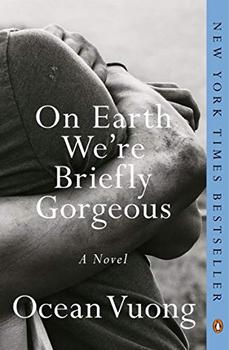Reading Guide Questions

Please be aware that this discussion guide will contain spoilers!
- When we meet the narrator of this novel, we don't know his name, only that he is writing to his mother in a language she cannot read. He says, "I am writing from inside a body that used to be yours. Which is to say, I am writing as a son" (10). How does the book explore the interplay of language—how he identifies himself and communicates the world—and lived, corporeal experience?
- What do the animals in the book—the monarch butterflies, the buffaloes, even the "little dog" after which the narrator is named—represent for the narrator? How does he try to understand their instinctual movements and behaviors?
- Names are precarious and shifting throughout the novel, for both the narrator and his mother. How does he feel about the name his grandmother gives him, Little Dog? Does his reflection that "to love something, then, is to name it after something so worthless it might be left untouched—and alive. A name, thin as air, can also be a shield" suggest acceptance or dismissal of his given name (18)?
- Without having language to connect them, how do the narrator and his mother communicate their love for one another? How would you describe their signs of affection, such as his kneading out her back and fetching her cigarettes? What is conventional and what is unconventional about their relationship?
- How does Lan act as a buffer between Little Dog and his mother? What holes does she help fill in in how he is raised, and what he understands about his past?
- Do the narrator and his mother have the same idea of what is required, or what it means, to be an American? How do their expectations compare with their experiences—his as a student and hers in the nail salon?
- How does being raised by two women, whose own relationship is complicated and fraught, impact the narrator? What does he come to understand about violence, sexuality, and loyalty from them? How does their triad blur the lines between generations, and within typical mother-daughter/mother-son relationships?
- Whom does the narrator have as a father-figure, if anyone? What does his relationship with Paul offer, and how is it limited?
- What does the narrator take away from the story of Tiger Woods? How is his example both inspiring and unattainable?
- What are the terms of the narrator and Trevor's love, if any? What does their refusal to name or speak about their relationship do to free, or limit, it?
- Part II ends with a poetic ode to Trevor, in which the narrator switches his point of view. How is he able to write about Trevor in the context of the letter? What would happen if his mother read it?
- What is the author's relationship with pain and violence, inherited and lived first-hand? How does he represent pain he suffers (from his mother and Trevor) in his writing? Compare how he relates painful versus pleasure: "Sometimes being offered tenderness feels like the very proof that you've been ruined" (119).
- How are both Trevor's family and the narrator's marginalized by society? Discuss the role of drugs for the young men and their friends in how they exercise agency and respond to the uncertainty of their lives.
- How does he respond to Lan's PTSD from the war in Vietnam? What about his life is like a war?
- What sacrifices do all the characters make in the novel? Consider which ones are voluntary and which are involuntary with regards to this reflection by the narrator: "What do you call the animal that, finding the hunter, offers itself to be eaten? A martyr? A weakling? No, a beast gaining the rare agency to stop. Yes, the period in the sentence—it's what makes us human, Ma, I swear. It lets us stop in order to keep going" (118).
- In addition to being a letter, the words of the book are an oblique ode to Trevor. How does the narrator use language to honor his memory, literally and metaphorically? Consider the description of his scar like a comma, and a mouth like a period.
- Discuss the setting of the novel and its various enclaves—the city versus the tobacco farm, etc. Does the narrator seem to be shaped by his environment, or vice versa?
- Does the family's story evoke pity or sympathy from you as a reader, and why if so? Consider how they use mood rings to evaluate if they're happy, and the idea that "Good was more often enough, was a precious spark we sought and harvested of and for one another" (214).
- While reading, did you know that the novel was autobiographical? How did that affect your understanding of the story if so, and if not does that change your interpretation of it now?
Unless otherwise stated, this discussion guide is reprinted with the permission of Penguin Books.
Any page references refer to a USA edition of the book, usually the trade paperback version, and may vary in other editions.

 Book Reviewed by:
Book Reviewed by:





